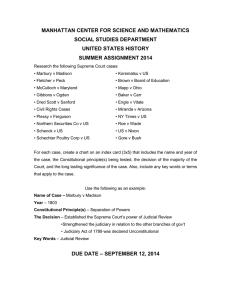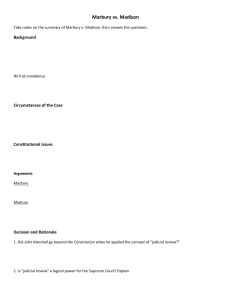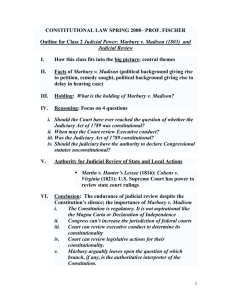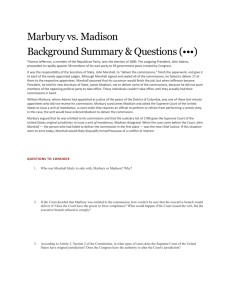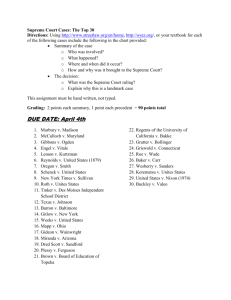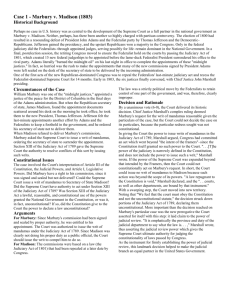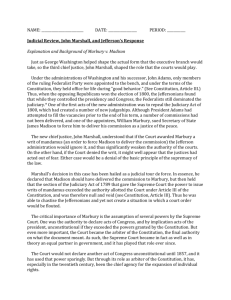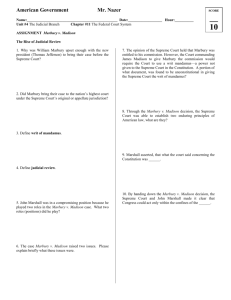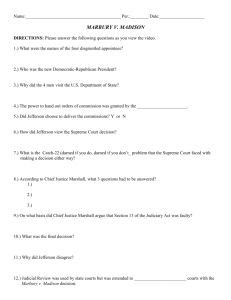Marbury v Madison Text
advertisement
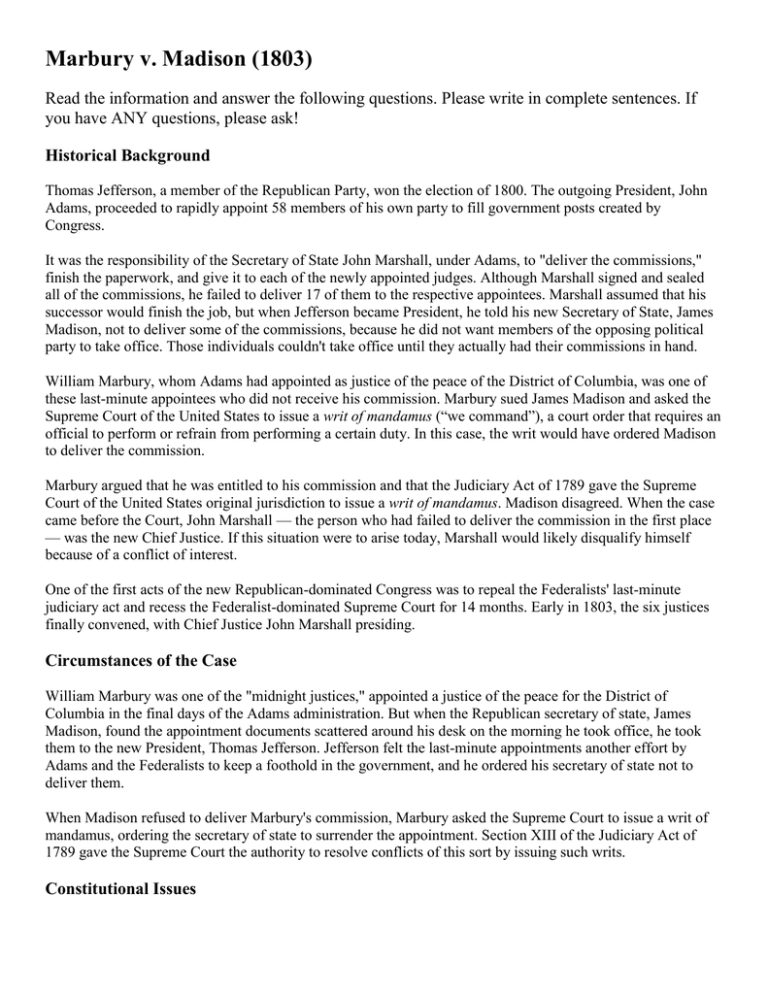
Marbury v. Madison (1803) Read the information and answer the following questions. Please write in complete sentences. If you have ANY questions, please ask! Historical Background Thomas Jefferson, a member of the Republican Party, won the election of 1800. The outgoing President, John Adams, proceeded to rapidly appoint 58 members of his own party to fill government posts created by Congress. It was the responsibility of the Secretary of State John Marshall, under Adams, to "deliver the commissions," finish the paperwork, and give it to each of the newly appointed judges. Although Marshall signed and sealed all of the commissions, he failed to deliver 17 of them to the respective appointees. Marshall assumed that his successor would finish the job, but when Jefferson became President, he told his new Secretary of State, James Madison, not to deliver some of the commissions, because he did not want members of the opposing political party to take office. Those individuals couldn't take office until they actually had their commissions in hand. William Marbury, whom Adams had appointed as justice of the peace of the District of Columbia, was one of these last-minute appointees who did not receive his commission. Marbury sued James Madison and asked the Supreme Court of the United States to issue a writ of mandamus (“we command”), a court order that requires an official to perform or refrain from performing a certain duty. In this case, the writ would have ordered Madison to deliver the commission. Marbury argued that he was entitled to his commission and that the Judiciary Act of 1789 gave the Supreme Court of the United States original jurisdiction to issue a writ of mandamus. Madison disagreed. When the case came before the Court, John Marshall — the person who had failed to deliver the commission in the first place — was the new Chief Justice. If this situation were to arise today, Marshall would likely disqualify himself because of a conflict of interest. One of the first acts of the new Republican-dominated Congress was to repeal the Federalists' last-minute judiciary act and recess the Federalist-dominated Supreme Court for 14 months. Early in 1803, the six justices finally convened, with Chief Justice John Marshall presiding. Circumstances of the Case William Marbury was one of the "midnight justices," appointed a justice of the peace for the District of Columbia in the final days of the Adams administration. But when the Republican secretary of state, James Madison, found the appointment documents scattered around his desk on the morning he took office, he took them to the new President, Thomas Jefferson. Jefferson felt the last-minute appointments another effort by Adams and the Federalists to keep a foothold in the government, and he ordered his secretary of state not to deliver them. When Madison refused to deliver Marbury's commission, Marbury asked the Supreme Court to issue a writ of mandamus, ordering the secretary of state to surrender the appointment. Section XIII of the Judiciary Act of 1789 gave the Supreme Court the authority to resolve conflicts of this sort by issuing such writs. Constitutional Issues The case involved the Court's interpretation of Article III of the Constitution, the Judicial Powers, and Article I, Legislative Powers. Did Marbury have a right to his commission, since it was signed and sealed but not delivered? Could the Supreme Court issue a writ of mandamus to Secretary of State Madison? Did the Supreme Court have authority to act under Section XIII of the Judiciary Act of 1789? Was Section XIII of the Judiciary Act a lawful, reasonable, and constitutional use of the powers granted the National Government in the Constitution, or was it, in fact, unconstitutional? If so, did the Constitution give to the Court the power to declare a law unconstitutional? Arguments For Marbury: Since Marbury's commission had been signed and sealed by proper authority, he was entitled to his appointment. The Court was authorized to issue the writ of mandamus under the Judiciary Act of 1789. Since Madison was clearly not doing his proper duty as a public official, the Court should issue the writ to compel him to do so. For Madison: The commissions were based on a law (the Judiciary Act of 1801) that had been repealed at a later date by Congress. The law was a strictly political move by the Federalists to retain control of one part of the government, and was, therefore, clearly improper. Decision and Rationale By a unanimous vote (6-0), the Court delivered its historic decision. Chief Justice Marshall's complex ruling deemed Marbury's request for the writ of mandamus reasonable given the particulars of the case, but the Court could not decide the case on its particulars, because the particular redress sought was not constitutional. In giving the Court the power to issue writs of mandamus in the Judiciary Act of 1789, Marshall argued, Congress had committed an act which went beyond "the intent of the framers"–since the Constitution itself granted no such power to the Court. ". . .[T]he power of the judiciary is narrowly defined in the Constitution, and does not include the power to issue such a writ," Marshall wrote. If the power of the Supreme Court was expanded beyond that intended by the Framers, then the Court could not constitutionally act on Marbury's request. In short, the Court could issue no writ of mandamus to Madison because such action was beyond the scope of its powers. "A law repugnant to the Constitution is void," Marshall declared, and the ". . .courts, as well as other departments, are bound by that instrument." With a sweeping step, the Court moved into new territory. Noting that "We feel that the court must obey the Constitution and not the unconstitutional statute," the decision struck down portions of the Judiciary Act of 1789, declaring them unconstitutional. More important than the decision reached on Marbury's particular case was the new prerogative the Court asserted for itself with this step: it laid claim to the power of judicial review. "It is emphatically the province and duty of the judicial department to say what the law is. . . ," Marshall wrote, thus asserting the judicial review power which gives the Supreme Court ultimate authority for judging the constitutionality of laws passed by Congress. As the instrument for firmly establishing the power of judicial review, this landmark decision helped to make the judicial branch an equal partner in the United States Government.
